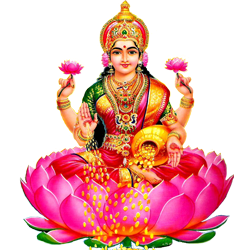Mother Lakshmi
Lakshmi is the Goddess of wealth and prosperity, both material and spiritual. The word ”Lakshmi” is derived from the Sanskrit word Laksme, meaning “goal.” Lakshmi, therefore, represents the goal of life, which includes worldly as well as spiritual prosperity. In Hindu mythology, Goddess Lakshmi, also called Shri, is the divine spouse of Lord Vishnu and provides Him with wealth for the maintenance and preservation of the creation.
In Her images and pictures, Lakshmi is depicted in a female form with four arms and four hands. She wears red clothes with a golden lining and is standing on a lotus. She has golden coins and lotuses in her hands. Two elephants (some pictures show four) are shown next to the Goddess. This symbolism conveys the following spiritual theme:
The four arms represent the four directions in space and thus symbolize omnipresence and omnipotence of the Goddess. The red color syinbolizes activity. The golden lining (embroidery) on Her red dress denotes prosperity. The idea conveyed here is that the Goddess is always busy distributing wealth and prosperity to the devotees. The lotus seat, which Lakshmi is standing upon, signifies that while living in this world, one should enjoy its wealth, but not become obsessed with it. Such a living is analogous to a lotus that grows in water but is not wetted by water.
The four hands represent the four ends of human life: dharma (righteousness), kama (genuine desires), artha (wealth), and moksha (liberation from birth and death). The front hands represent the activity in the physical world and the back hands indicate the spiritual activities that lead to spiritual perfection.
Since the right side of the body symbolizes activity, a lotus in the back right hand conveys the idea that one must perform all duties in the world in accordance with dharma. This leads to moksha (liberation), which is symbolized by a lotus in the back left hand of Lakshmi. The golden coins falling on the ground from the front left hand of Lakshmi illustrate that She provides wealth and prosperity to Her devotees. Her front right hand is shown bestowing blessings upon the devotees.
The two elephants standing next to the Goddess symbolize the name and fame associated with worldly wealth. The idea conveyed here is that a true devotee should not earn wealth merely to acquire name and fame or only to satisfy his own material desires, but should share it with others in order to bring happiness to others in addition to himself.
Some pictures show four elephants spraying water from golden vessels onto Goddess Lakshmi. The four elephants represent the four ends of human life as discussed above. The spraying of water denotes activity. The golden vessels denote wisdom and purity. The four elephants spraying water from the golden vessels on the Goddess illustrate the theme that continuous self-effort, in accordance with one’s dharma and govemed by wisdom and purity, leads to both material and spiritual prosperity.
Goddess Lakshmi is regularly worshipped in home shrines and temples by Her devotees. A special worship is offered to Her annually on the auspicious day of Diwali, with religious rituals and colorful ceremonies specifically devoted to Her.

